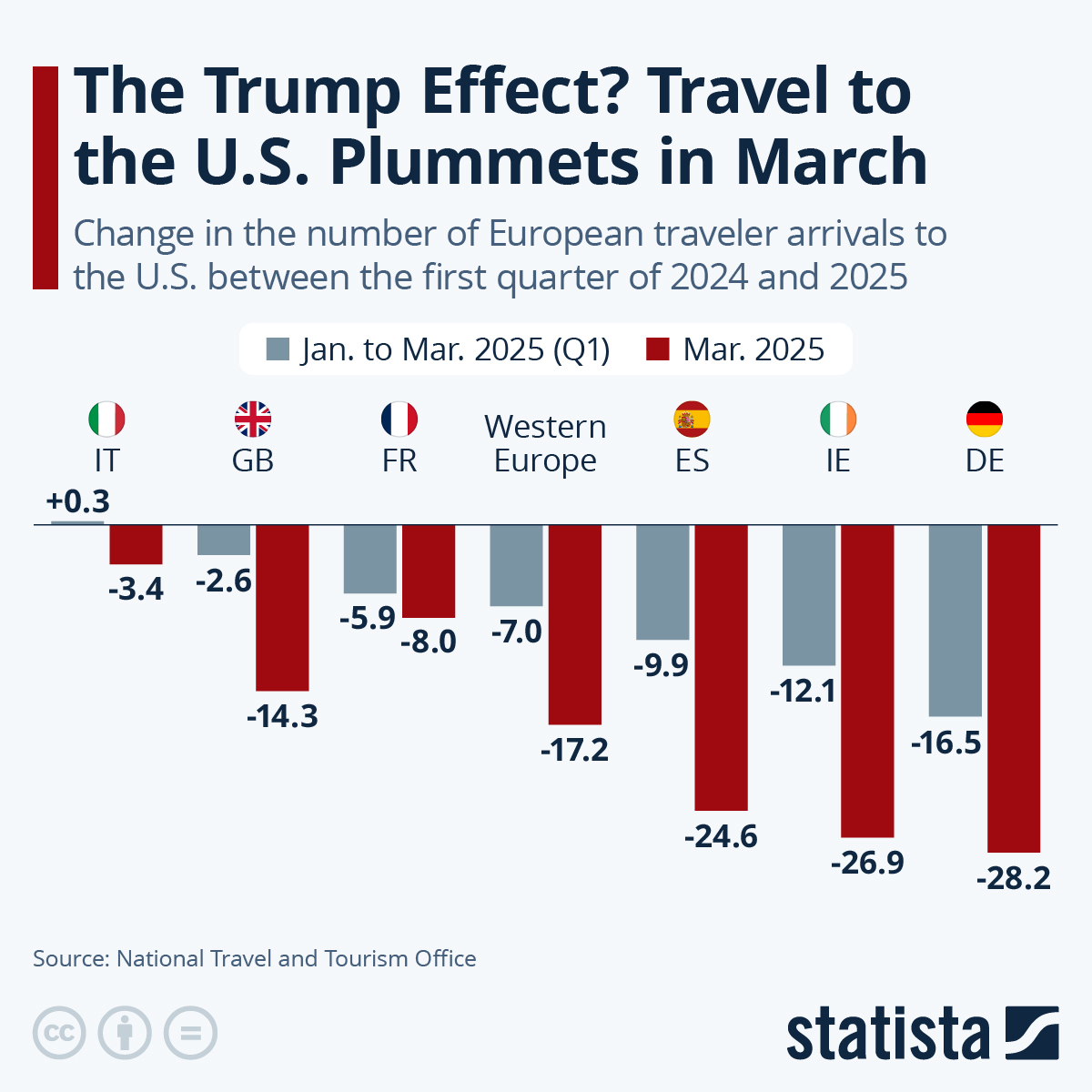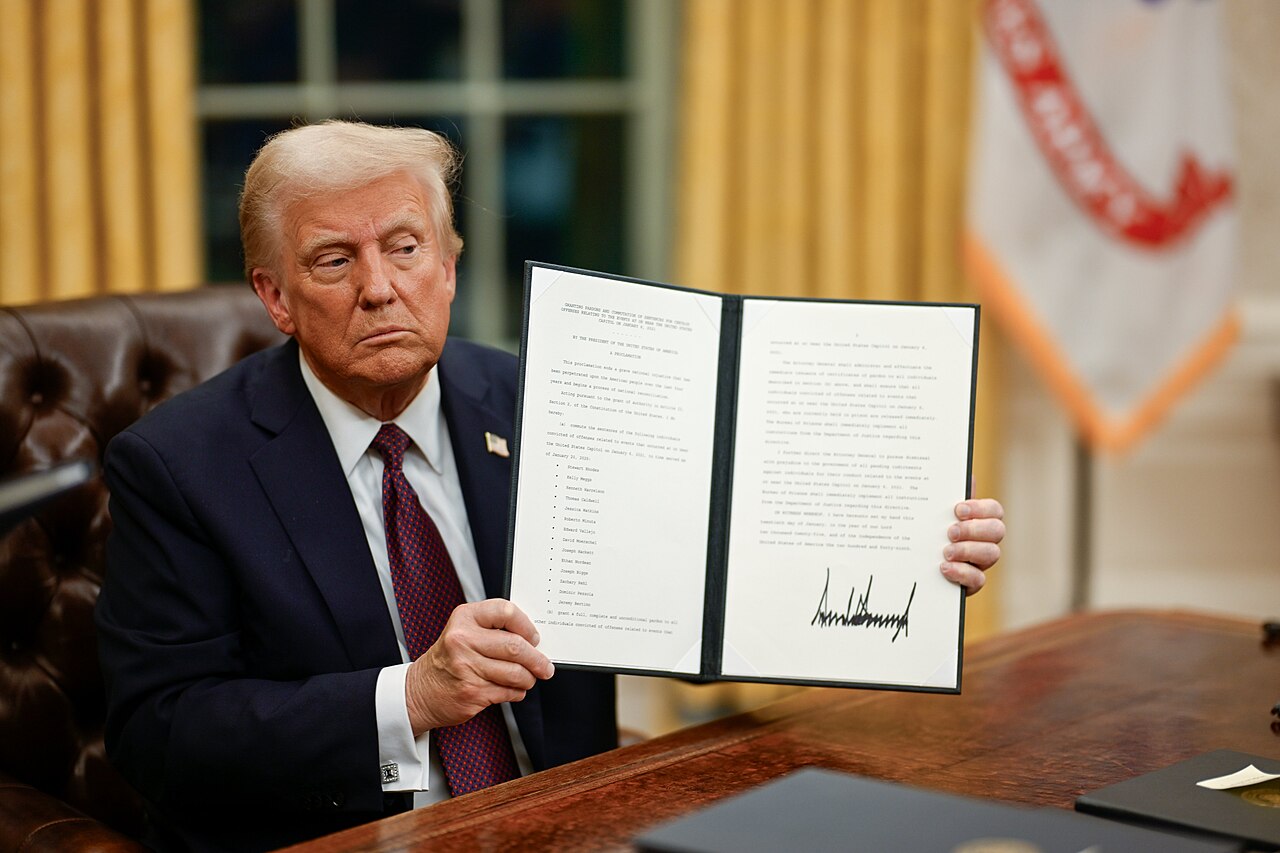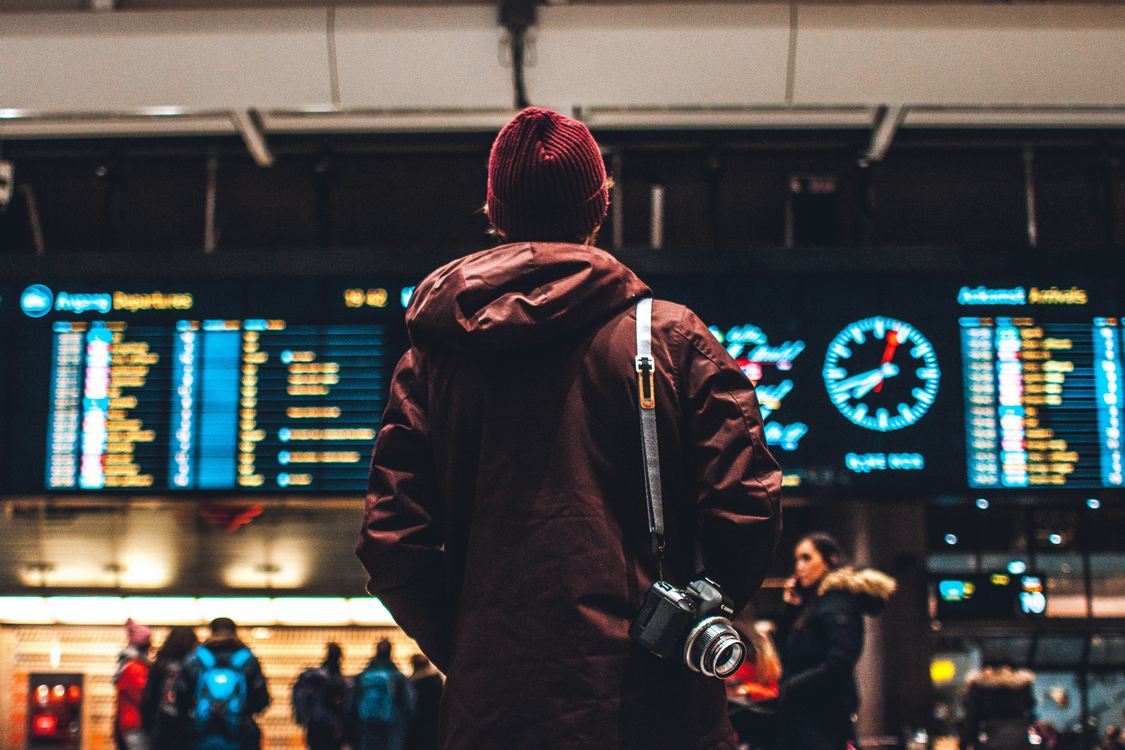The effects of President Trump’s stricter border controls, immigration, and even censorship policies may have had a direct impact on the nation’s tourism sector, as many Europeans are opting for other shores during the spring holiday period.
According to National Travel and Tourism Office data from the first quarter of 2025, multiple metrics demonstrate a not-insignificant shift in arrivals to the country compared to the same period in 2024. Travelers from Western Europe—including both tourists and business visitors—fell by roughly 17% in March, and by 7% overall since January.
The trend is even greater in countries like Ireland (24%), Germany (28%), and Spain (26%), despite all three being eligible for the US’s Visa Waiver Program.
Immigration lawyers, data scientists, and travel economists suggest that Trump’s strict border control policies, but also his unexpected assault on freedom of speech in the United States over his first 100 days have soured the country as a potential tourist destination.
An article by ABC News Australia cited reports “of Australians being held for several hours at US airports before being sent home,” and of visiting academics “cancelling trips to major US conferences over concerns of being detained”. This isn’t Syria or Russia that’s being discussed, but Australia, one of America’s closest allies.
While even the opponents of the President’s immigration policies may have been reluctant to go so far as to accuse him of tanking the tourism industry, his Day 1 immigration executive order mentions “enhanced vetting and screening for all foreign nationals intending to enter, or already present in, the United States”.

Melissa Vincenty, managing director of Worldwide Migration Partners, told ABC that while each case is different, and while US Customs and Border Protection (CBP) officers have always been able to conduct searches including of electronic items, “the hype is real”. She claimed that CBP use AI-powered programs that will search phones for keywords, potentially pulling up emails and messages saved on your phone over, say, a private conversation you had with a friend regarding the state of Israel.
“It’s not a court of law, you do not have any way to dispute it,” Ms, Vincenty said, adding earlier in a different comment that there aren’t many rights a non-citizen of the US can exercise, and that CBP officers have overwhelming power to permit or refuse entry into the country, including arbitrarily. In fact, Vincenty recommended Australian visitors to the US bring a “burner phone” not because she imagines they have something to hide, “but do you want a border official to have access to basically your whole life?”
She wasn’t the only one suggesting the use of a burner phone. The Electronic Frontier Foundation (EFF) provided SCMP with a list of guidelines for protecting data, rights, and devices whilst traveling internationally, and with a special focus on the United States where stories of extensive digital searches and seizures are becoming worryingly common for a traveler’s perspective.
EFF also recommended bringing a secondary travel phone or computer, but even warned that a completely wiped or clean device might appear “suspicious”. EFF recommends using strong encryption that will make it difficult for the CBP programs to access saved or cloud data, make a backup of anything you care to lose, and be prepared to answers to questions that may be posed around certain kinds of data. Delete social media accounts if necessary, and try and calmly assert your right, as a citizen, not to be searched without a warrant if there is a threat of confiscation, but be ready for those devices to be confiscated.

‘Unpredictable landscapes’
“We say everyone should have a plan before travel,” said Sophia Cope, senior lawyer with the EFF. “The traveler has to know what they’re going to do in that moment. Either they’re going to comply or they’re not going to comply”.
Vincenty also suggested to be prepared, and to think of ways to make the CBP interview more expedient, such as by printing out paper copies of hotel reservations and plane tickets. If kept all on the traveler’s phone, and the traveler unlocks it willingly, the CBP officer may just say “‘well, we’ll just take a look'”.
She said that admitting to or being discovered to have used a drug that is illegal in the United States, even if it was under legal circumstances in the traveler’s home country, can result in a lifetime ban from entry into the US.
“Travelers to the United States are facing a more unpredictable landscape under President Trump’s second term,” Paul Mutter, a travel risk analyst at RiskLine, told WaL. “Ramped-up enforcement efforts [are ongoing] to remove or deny entry to travelers and long-term residents for minor criminal convictions or entry violations, such as failing to fully declare prohibited items or disclose social media accounts”.
“Even travelers with valid visas or ESTA waivers have been denied entry or detained over minor infractions. At US entry points, particularly along the US-Mexico and U.S.-Canada borders, secondary screenings have increased, resulting in long delays and invasive searches,” said Mutter.
“Rapid policy changes, sometimes triggered by administrative errors, have also led to individuals being forced to leave the country, even when they do not meet the criteria for self-deportation. Travelers should not expect a quick resolution to legal challenges against such measures; detainment may last for weeks before release or deportation”.
It seems a difficult pill to swallow for the European, since the citizens of the US are able to travel largely anywhere in Europe without any form of additional documentation—of the kind required under the ESTA program, which costs $60 per person—and sometimes even enjoy their own special passport control lines, such as in Milano Malpensa Airport.
“In January, the US government stopped recognizing gender-neutral passports, creating uncertainty for travelers with this type of document,” Mutter added.
Germany is one such nation, and the President’s decision goes some way perhaps in explaining the large drop in German visitors—the highest of any large country in Europe over that period, according to Statista. However, a large section of nations that are almost certain to qualify for the 2026 FIFA World Cup, held that year in conjunction with Canada, also recognize these passports. These include Germany, Australia, Canada, Uruguay, Argentina, Colombia, and Mexico. Norway and Costa Rica could also be in with a chance at qualification as well. Officially, fans with an X in the field marked ‘sex’ will not be able to enter the US to see the matches.
“Before departure, travelers should review current legal entry requirements, consider obtaining a temporary prepaid mobile device, and keep relevant consular contact information accessible in case of detention by US,” Mutter concluded.
Trump’s crackdown on free speech
Vincenty confirmed to ABC that she was aware of an Australian martial arts practitioner who was detained and kept in a cell for 24 hours after being denied entry into the US, though she admitted she didn’t have all the details.
One thing which all three: Vincenty, Mutter, and Cope touched on was activist content or behavior in realms which the second Trump Administration has proven hostile to; above all the question of Israel’s war crimes against the Palestinians.
When TIME Magazine asked Trump on April 22nd why his administration is deporting “hundreds of people for engaging speech you don’t like” after he “castigated efforts to suppress” free speech on the campaign trail, using the treatment he believed he received during his interim-president period as an example, he referenced “tremendous anti-Semitism”.
Multiple extra-judicial examples of detention in Trump’s second term have centered around students protesting Israel’s treatment of the Gazans since October 2023, arresting and jailing lawful permanent residents and visiting scholars.
According to a review from the Poynter Institute, “the administration has sought to revoke the legal status of other student protesters including visa holders and lawful permanent residents“.
When questioned over some of the relevant deportations, Secretary of State Marco Rubio argued, “they’re here to go to class… they’re not here to lead activist movements that are disruptive and undermine our universities”. Activism is protected by the First Amendment, and nothing in the Bill of Rights stipulates that the rights therein are enjoyed by “US citizens”. In the whole of the Constitution, there is sufficient reference to citizens and citizenship only to cause argument among scholars and controversy over decisions.
But as is the case pretty much everywhere on Earth, there is only a limited amount of political energy possessed by residents, and that is very rarely expended on behalf of those not from the country therein, i.e. tourists. WaL
We Humbly Ask For Your Support—Follow the link here to see all the ways, monetary and non-monetary.
PICTURED ABOVE: President Donald Trump signing executive orders. PC: The White House




Even EU travelers from Ireland, Germany, and Spain—with Visa Waiver privileges—are avoiding the U.S. by over a quarter.
What really unsettles me is learning that policies aimed at tightening borders and increasing censorship—like phone searches and visa scrutiny—are driving this shift.
And it’s not just anecdotal—official data confirms international traveler numbers are down nearly 12% in March, which could ripple through hospitality, airlines, and local economies.
Effectively, the message being sent to global visitors is shifting—from “All are welcome” to “Be cautious.” That’s a tough pill for anyone in tourism or international business to swallow.
The real danger? Experts expect this downward trend might last, pushing America to lose billions in tourism revenue and potentially delaying a return to pre-pandemic levels until 2029.
And from a humanistic point, I think it’s fair to suggest that the level of liberty exercised and guaranteed in a country is best measured by the treatment of those whose liberties are not guaranteed—i.e. visitors, prisoners, refugees, etc. If these transiets are secure in their liberties, those with the benefit of citizenship will doubtless be the same.
Wow, it’s wild to see how much Trump’s immigration policies are shaking up tourism in the U.S. The sharp drop in international visits makes you realize how much the travel industry can be influenced by government decisions. From the article, it’s clear that these stricter rules aren’t just about politics—they’re actually affecting people’s ability to experience what America has to offer. Whether it’s families trying to visit loved ones or tourists planning their dream vacation, these new policies are leaving a major impact. You start to wonder, is the U.S. losing its “welcome mat” appeal? It’s a shame when travel restrictions get in the way of cultural exchange and the economic boost tourism brings. It’s definitely something worth keeping an eye on as this trend seems like it’s going to last for a while. Curious to see how this plays out for local businesses and international relations in the future.